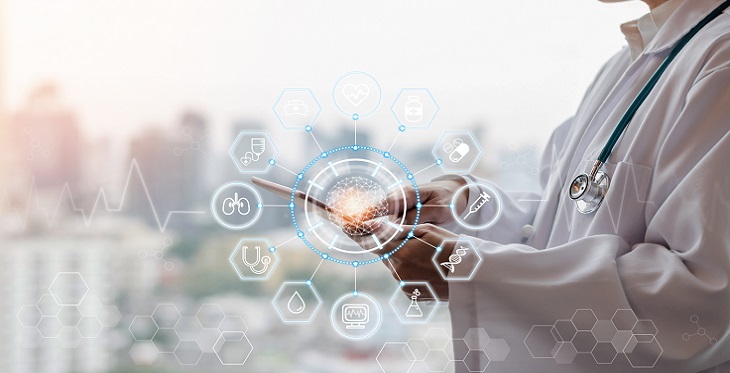As more and more people turn to telehealth services for care, it is becoming increasingly important for physicians and the entire healthcare industry to have access to technology that can help improve patient care. Luckily, artificial intelligence (AI) is quickly emerging as a powerful tool that can do just that.
Artificial Intelligence (AI) is being increasingly used in telemedicine to allow doctors to make more data-driven, real-time decisions that may improve the patient experience and health outcomes by allowing them to work more toward virtual care alternatives throughout the care continuum.
According to a study from MIT, 75% of healthcare facilities that utilized AI reported improved capacity to manage illnesses, and 4/5 said it aided in reducing employee fatigue. AI in healthcare is a promising strategy for the future of medical delivery, given that Covid-19 places a strain on both industries--the amount of patient data analysis, and the number of people who need medical attention.
In one example, an AI system was used to help a doctor in India manage his telehealth patient load. The system, which was designed by US-based company Welltok, was able to provide real-time analysis of the doctor’s interactions with patients and make recommendations on how he could improve his care. This lowers call volume for health plans, providers, and employer benefit managers while providing an on-demand customized experience.
Concierge, the AI chatbot by Welltok, can help increase resource efficiency, provide cost transparency, and direct customers to lower-cost alternatives. The AI chatbot has an accuracy rate of 98 percent and was found to save consumers time by over 60%.
How is Artificial Intelligence Used in Healthcare Services?
There are a number of ways that AI is being used in healthcare to improve healthcare services and medical practitioners’ abilities to provide quality care.
Some of the ways AI is being used include:
1. Automated health record analysis
Automated health record analysis is one of the most commonly used applications of AI in healthcare. This involves using machine learning algorithms to analyze large amounts of medical data in order to identify patterns and trends that can be used to provide the appropriate treatment and improve patient care.
This type of AI-based analysis is being used by a number of different organizations, including the Mayo Clinic, IBM, and Google.
2. Virtual nursing assistants
Virtual nursing assistants are another way that AI is being used to deliver healthcare services. These assistants use natural language processing (NLP) to understand questions asked by patients and provide answers based on information from their electronic health records.
One example of a virtual nursing assistant is the app NurseWise, which was developed by the American Nurses Association. This app provides nursing advice and guidance to patients 24/hours a day, seven days a week.
3. Predictive analytics for population health management
Healthcare organizations are also using predictive analytics to manage population health. This involves using machine learning algorithms to predict future health risks, analyze patients' symptoms and evaluate needs based on data from a variety of sources, including electronic medical records, claims data, and patient surveys. AI in telehealth is also being used to assist physicians in providing care.
A number of companies are working on AI-powered telehealth solutions, including Teladoc, which offers a platform that uses machine learning to provide real-time insights to doctors during in-person consultations.
4. Remote Patient monitoring and engagement
RPM, which stands for remote patient monitoring, has begun to be one of the most popular approaches for managing chronic diseases. RPM is a way to gather and transmit patient health data to medical specialists outside of a doctor's office or a clinical environment via linked technology.
This type of technology advances enables both health professionals and patients to take a proactive role in treating patients and managing chronic diseases, as well as other conditions which can result in improved health outcomes and reduced healthcare costs.
Monitoring devices such as the Apple Watch, Google Fit, and other wearables are being used to collect patient information and other vital signs like heart rates, sleep patterns, and physical activity levels. This data is then transmitted to a secure server where it can be accessed by primary care physicians, specialists, and other healthcare providers.
5. Schedule and remind hospital visits
This is one of the most important and difficult tasks for patients. If a patient misses an appointment, it can put their health at risk and cost the healthcare system money. To address this problem, some hospitals are using AI-powered chatbots to schedule and remind patients of their upcoming in-person visits or simply notify related patients of important health reminders. One example is the chatbot myCheck-in, which was developed by Myriad Genetics. This chatbot uses a patient's data from their electronic health record to remind them of their upcoming appointment and help them check-in for their visit.
6. Medical Training
Health information technology (HIT) is being used to provide more immersive and realistic medical training experiences. This type of training can help prepare healthcare practitioners for a variety of different situations, including interacting with patients, using new technologies, and understanding the complexities of the healthcare system.
One example of how AI is being used for medical training is by providing virtual reality (VR) simulations. These simulations can provide a realistic and immersive experience for healthcare professionals in training. One company that is working on this technology is Medical Realities, which offers a VR platform that allows users or healthcare professionals to experience different medical procedures.
In addition, another example of how AI is being used for medical training is by providing online courses that are tailored to the individual learner. This type of training can help learners focus on the areas where they need the most improvement. Coursera is one company that offers such courses. Their AI in Healthcare Specialization includes four courses that cover a variety of topics, including machine learning, natural language processing, and predictive analytics.
7. Assist in delivering healthcare to patients via telemedicine services
AI is also being used to assist in delivering healthcare to patients via telemedicine services. Telemedicine services enable patients to receive medical care and other health services even from a distance. This type of care can be useful for patients who live in remote areas or who have difficulty travelling to see a healthcare provider.
One example of how AI is being used for telemedicine is by providing real-time feedback to physicians. This is done by using machine learning algorithms to analyze patient data and provide insights that can help improve care. Teladoc, which offers a platform that uses machine learning to provide real-time insights to doctors during in-person consultations.
Another example of how AI is being used for telemedicine is by providing automatic reminders to patients. This is done by using machine learning algorithms to analyze patient data.
8. Provide accurate patient diagnosis for better health outcomes
This is just the beginning for AI in healthcare. In the future, AI will likely play an even bigger role in improving the quality and accessibility of healthcare services. Thanks to advances in AI, telehealth is becoming more widely available and affordable, making it easier for people to get the care they need without having to travel long distances. We can expect to see even more amazing innovations in healthcare in the years to come!
9. Medical care for the elderly patients
Elderly people often have complex medical needs and AI can help provide them with the care they need. One way AI is being used to care for the elderly is by providing personalized medication recommendations. This is done by using machine learning algorithms to analyze a patient's health data and provide insights that can help improve their care. Another example of how AI is helping to care for the elderly is by providing virtual assistants. These assistants can help with a variety of tasks, including scheduling appointments, reminding patients to take their medication, and providing information about their health condition. One company that offers a virtual assistant for the elderly is CarePilot. Their assistant, called Amy, can help with a variety of tasks, including scheduling appointments, reminding.
10. Health apps for mental health issues
Mental health is an important issue and AI can help provide people with the care they need. One way AI is being used to help with mental health is by providing chatbots that can provide support and guidance. One such chatbot is called Wysa, which was developed by the company of the same name. Wysa provides users with personalized support and guidance. Another example of how AI is being used to help with mental health is by providing virtual assistants. These assistants can help with a variety of tasks, including scheduling appointments, reminding patients to take their medication, and providing information about their health conditions.
11. Improve patient outcomes by reducing hospital readmissions
Hospital readmissions are a major problem in the US healthcare system. They cost billions of dollars each year and often result in poorer patient outcomes. AI can help reduce hospital readmissions by providing insights that can help improve care. One example of how AI is being used to reduce hospital readmissions is by providing real-time feedback to physicians. This is done by using machine learning algorithms to analyze patient data and provide insights that can help improve care. Teladoc, which offers a platform.
Conclusion
AI is playing an increasingly important role in healthcare. It is being used to improve the quality and accessibility of healthcare services. Thanks to advances in AI, telehealth is becoming more widely available and affordable, making it easier for people to get the care they need without having to travel long distances. We can expect to see even more amazing innovations in healthcare in the years to come!

